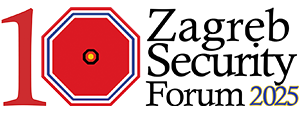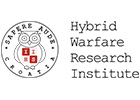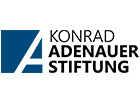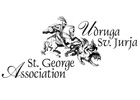
Call for Papers - Forum 2023
The 8
th Zagreb Security Forum 2023
Hybrid Warfare Research Institute & St. George Association
October 20-21st, 2023
Zagreb, Croatia
Call for Papers:
Transatlantic Cooperation and New Security Architecture
Security Challenges in Existing and Emerging Conflicts
Strengthening Democracy, Protecting Freedom and Society
Scientific and professional papers presented at previous ZSF’s have indicated a strong relationship between state and societal stability and security, and the resilience of its key critical infrastructure. Also, existing, and emerging security threats that might become conflicts on different levels of their existence, will employ multiple attack vectors and a variety of means. They might be controlled by different government, non-governmental, and proxy groups, organizations, departments, and agencies. The attacker will try to shape, influence, and control all these processes so that he can adapt them to his needs and goals.
The creation of crises and conflicts at the local levels can stimulate and influence the creation of new, and intensification of existing, crises in different geographical areas. Therefore, determining the cause-and-effect relationship between different crisis situations is a necessity in order to: (a) be able to recognize and understand their causes, (b) recognize early warning signals for crisis that might appear, (c) organize and prepare the whole-of-society defense system for reaction to the crisis, (d) to improve the resilient intelligence based systems at the national and international level according to the lessons learned and (f) to enable the development of trust and the exchange of information and knowledge at the national and international level.
The emergence of the global Corona crisis pointed to the need for strategic thinking and dealing with modern and future challenges that have a low frequency of occurrence but can produce very strong negative effects for society and the state. Russia's unprovoked and unjustified aggression against Ukraine in 2014, and especially in 2022, indicates the need to create reliable strategic forecasts of processes and activities that can negatively affect our democracy and our freedoms.
In order to effectively counter the hybrid threats of the 21st century, future needs and capacities must be planned with foresight on possible threats, probabilities and outcomes. In this context, it is necessary to analyze the effectiveness of the existing security architecture and its reaction to the challenges and risks we have been facing in the last decade. Is this security architecture sufficient to defend democracy and freedoms? Should it be changed and adjusted in the future in accordance with the anticipated security challenges? Can the experiences with present security architecture (such as NATO and EU), and in what way, be applied to other parts of the world so that crises and challenges can be better managed and lead to fast and efficient de-escalation and peaceful resolution of challenges and misunderstandings? Can we apply the existing security architecture, and in what way, to the challenges we face in the geostrategic transitions on the Arabian Peninsula, Africa, all of Asia, South America? The answer to the possibility of understanding and coping with existing and future climate changes, which will lead to serious negative influences in numerous societies and countries, is particularly important. These changes will create even stronger security challenges in the future, to which some future security architecture will have to offer effective answers.
We welcome paper proposals, with scientific background, on every issue relating to the conference theme, with special emphasis on:
- A potential nexus between Hybrid Threats, climate change, and environmental considerations,
- Deep analysis of Russian aggression on Ukraine with emphasis on preparation of armed aggression, its hybridity, causing crises and conflicts in other geographical areas with focus on hybrid threats to societies in NATO allies and EU member states.
- The role of Strategic Communication and Crisis Management in countering Hybrid Threats through the study and analysis of practical case studies,
- Case studies and the role of disinformation in influence operations (cognitive ops),
- The role of Technology and R&D in early detection and prevention of Hybrid Threats in 21st century conflicts and wars,
- Malicious influences to the rise of Radicalism, Political Extremism, Violence, and Terrorism;
- Advantages, limitations, ethical questions, and legal consequences of counter-hybrid threats activities.
- The concept of and role of Strategic Culture in a hybrid threat context;
- Role of foresight in grand strategy planning, development, and training
- Concept of Strategic culture and its connectiveness with Hybrid threats as a target, mean and source of them in 21st Century (such as Digital Cold War, Economy Warfare with accent on Energy Warfare)
Please submit your paper proposal abstract of 250-300 words and your detailed CV in English by email
The deadline for proposal submissions is December 16, 2022. Notifications of acceptance will go out by January 16th, 2023.
Conference presenters are invited to submit their revised paper after the Forum in form of an article to the National Security and The Future journal.Notifications of acceptance will go out by February, 2023.
Conference presenters are invited to submit their revised paper after the Forum in form of an article to the National Security and The Future journal.
Further information are available at our website www.zagrebsecurityforum.com
For more info about Forum papers, please Contact us.
With kind regards,
| Prof.Dr. Shlomo Shpiro |
Holger Haibach |
Assist.Prof Gordan Akrap |
|
Europa Institute, BIU
|
KAS office HR/SLO |
Hybrid Warfare Research Institute
|
 |
 |

|